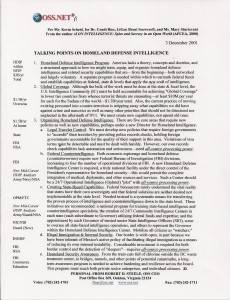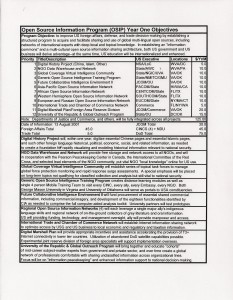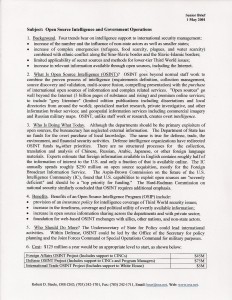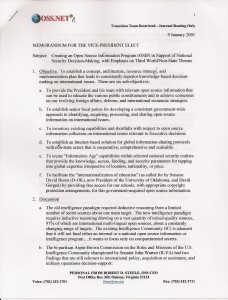As read by Condi Rice through the professional channel of Kevin Scheid, then on the Transition Team.

Link Fixed 29 Sep 2011 1230
During the August recess this got in to several SASC staff that were contemplating an OSINT initiative. Don Gessman provided the recommended breakdown including an earmarked amount for inter-agency OSINT. The Department of Defense and the Combatant Commands have always been the central organizing base for a national OSINT program, which would be funded by non-reimbursable defense allocation.
Below add up to $125M at Initial Operating Capability (IOC). See the separate Memorandum on a $2B a year Full Operating Capability (FOC) centered on Defense but inclusive of Whole of Government planning, programming, budgeting, and campaigning (PPBC).

With help from Don Gessaman, Sean O'Keefe at Office of Management and Budget (OMB) was briefied on the need for a national Open Source Program, and agreed in principle to a $125 million first year start. Then he moved to the National and Aeronautics Administration, and the opportunity for a Presidential Initiative was lost.

The below memorandum was delivered to the Vice-President-elect via the Transitioin Team. Although Condi Rice, prodded by Kevin Scheid, did read a related memorandum on reforming national intelligence, and asked for a tailored one-pager on homeland security, the White House never really got it and Sean O'Keefe left the Office Management and Budget (OMB) before they could be briefed into a Presidential Initiative that was ready to go at $125M a year Initial Operating Capability, climbing to $2B a year at Full Operational Capability (FOC).

J Kirkwood jrkirkwood at earthlink.net
Wed Sep 20 17:32:50 EDT 2000
• Previous message: Deutch as DCI
• Next message: MI6 building bombed?
• Messages sorted by: [ date ] [ thread ] [ subject ] [ author ]
I am forwarding this with Mr. Robert Steele's permission, and it should answer Mr. Aftergood's recent post, as well as the original post regarding the ‘competition' that was held with regard to open-source intelligence.
Jason Kirkwood
Robert David Steele, OSS CEO wrote:
Mr. Kirkwood,
Thank you for your thoughfulness is sending along the Stratfor discussion. Please feel free to post this to the forum if you wish, as you surmized, I no longer participate in any list discussions for lack of time.
The Aspin-Brown Commission had four witnesses on open source: Tony Lake, RAND, David Sarnoff Lab in Princeton, and OSS. Lake was behind closed doors but probably said he > relied heavily on informal academic and business contacts. RAND said everything was on the Internet and they knew how o get it. Sarnoff said that high definition television (their pet rock at the time, funded in part by NRO) could solve all open > source issues (but somebody else would have to feed them the sources). I did my normal spiel. At the end of the day, at 1700 almost precisely, General Lew Allen, USAF (Ret) and member > of the Commission, asked me if I would be willing to undertake a benchmarking exercise. I agreed, he turned to Britt Snider, the Staff Director, and instructed him to tell the IC to deliver anything they had on Burundi by 1000 Monday (this was a Thursday at COB). I had my assistant send faxes and followed up with calls from Las Vegas (DEFCON) on Friday, and by 1000 Monday the
Commission received:
+ top ten journalists in world on this matter, from LEXIS-NEXIS
+ top ten academics via citation analysis, from Institute of Scientific > Information
+ one paragraph precis of all stories on this in past, and one page orders of battle on the clan/tribes, from Jane's
+ 22 two page top level political military briefs from Oxford Analytica on UN, US foreign policy implications of this matter
+ list of all immediately available Soviet military combat charts for the whole country (US had no tactical maps at the time)
+ belatedly, as I did not know them that week-end but found them a week later, list of images for the entire country, cloud free and less than three years old, suitable for creating 1:50,000 combat charts
The staff was shocked by the comparison and decided this was “too hard” an issue, and planned not to include it or its implications in the final report. Since all commissions are manned by rotations, I knew of this within 24 hours. I wrote a letter to Harold Brown, and he was wise enough to see that this needed to be pursued. He assigned a three person member panel to focus on this, without further reference to me, and they came to two conclusions, the second of which was new to me but which I have since adopted :
1) The IC is severely deficient in its access to open sources, and this should be a top priority for funding and a top priority for DCI attention.
George Tenet subsequently decided he was not in the open source business and allowed FBIS to continue on its downward spiral and COSPO to languish in the death of a thousand slights. The DI, however, and especially the ADCI for Analysis and Production, John Gannon (one of the top people I really really admire), did not let this lesson go past them, and have done what they could, within the severe limits of their discretionary income (very low), to examine alternatives.
2) From page 17: The Commission believe that intelligence agencies should not satisfy requests for analysis when such analysis could be readily accomplished using publicly available information….The Commission believes that in general intelligence agencies should not accept requests for analysis when it is clear in advance that the information available from intelligence sources would have a marginal impact on a particular analysis.
This is the part that George read, perhaps because it was in bold print and far forward in the book.
Unfortunately, as Ellen Siedman, Special Assistant to Reagan, said at one > of my lunches, “Treasury, Commerce, the Fed *don't know how to do intelligence*.” This is why my book outlines the need for a Director General of National Intelligence within the revitalized and restructured White House Staff, with the National Intelligence Council expanded and elevated to be directly responsive to the DGNI, and the DCI (now the Director of Classified Intelligence to have full program authority over *all* of the collection and classified analysis capabilities, while we create a “peer” Global Knowledge Foundation with $1.5B a year to harness open sources worldwide, and to orchestrate a web-based means of sharing baseline OSINT collection and analysis and discussion and distance learning on topics of mutual interest.
It will take another ten years, but this is where we need to go. I am now much beyond OSINT, and focusing on the global burden sharing aspects of the problem.
Pages 17 and 88 in the commission report contain the most relevant passages.
Best wishes,
Robert
>
> >Date: Wed, 20 Sep 2000 08:09:52 -0400
> >To: Steven Aftergood
> >From: “Robert David Steele, OSS CEO”
> >Subject: Steve, You are Half Wrong
> >Cc: “Mr. Vernon Loeb”
> >
> >
> >Steve,
> >
> > I chose not to glorify the Stratcom thing with a response, but you are also wrong to go on the record saying it was untrue. Vernon is the one who best researched this. While I was not privy to exactly what they provided, I am privy to come comparisons, and it did center around the World Fact Book. We blew them away with over $100,000 in nominal stuff delivered via overnight mail.
> >
> > Having said that, I would go on to say, on the record, that CIA, the DI, learned from this while COSPO did not. The DI subsequently sponsored a Global Coverage program with numerous pilot projects, and OSS is pleased and privileged to have been one of the winners of this competitive exercise. The DI is capably exploring direct one stop shop support, web technology, side by side academics, structured outreach programs, subcontracting of election polling for specific foreign elections, and so on.
> >
> > In my own mind, OSINT and the Burundi exercise are in the past. The private sector is no smarter today than when the Burundi exercise took place. The Society of Competitive Intelligence Professionals is in the fourth grade, and there is no serious capability in the private sector equivalent to the Directorate of Intelligence at CIA.
> >
> > Best wishes,
> > Robert
Intelligence Forum (http://www.intelforum.org) is sponsored by Intelligence
and National Security, a Frank Cass journal (http://www.frankcass.com/jnls/ins.htm)